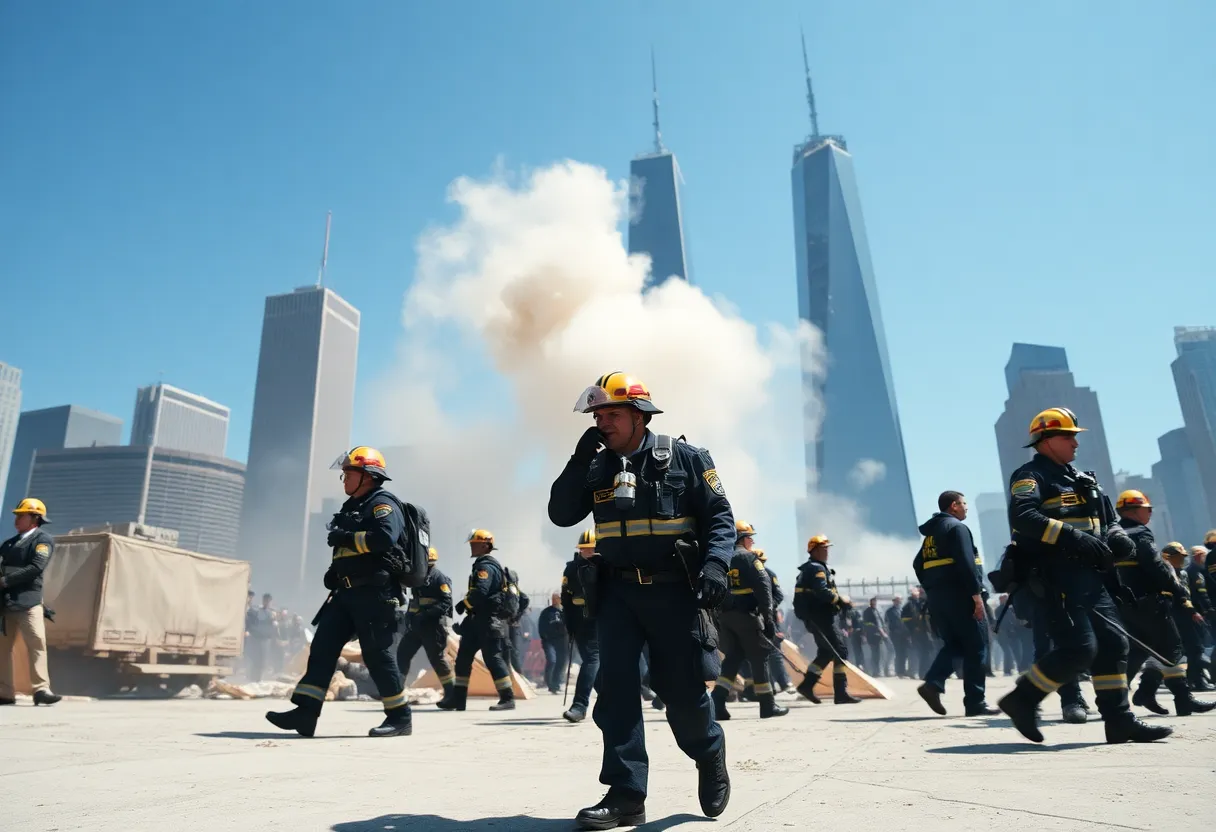News Summary
The health consequences of 9/11 continue to affect thousands, particularly through cancer linked to toxic exposure at Ground Zero.
Disaster from the Skies: The Lingering Health Crisis from 9/11
As the world remembers the tragic events of September 11, 2001, many often overlook the devastating health impacts that continue to plague those who were exposed to the wreckage and debris of the World Trade Center (WTC). While the horrific attack claimed thousands of lives on that fateful day, statistics now reveal that countless others have suffered dire health consequences in its aftermath, particularly from cancers linked to toxic exposure.
The Fallout from Ground Zero
The attack obliterated building materials, furniture, and electronics, releasing heavy clouds of dust that enveloped lower Manhattan. This toxic dust lingered for months, robbing residents and first responders of their breath and health. Analysis now connects exposure to this debris with an alarming rise in cancer diagnoses, with more individuals perishing from these ailments than were lost during the attacks themselves. A recent study published in a leading medical journal highlights the direct correlation between the WTC debris and increased risk of various malignancies.
The All-Too-Real Statistic
It’s estimated that approximately 400,000 individuals—including first responders, survivors, and cleanup crew—were exposed to deadly dust at Ground Zero. As time passes, the revelation is startling that cancer linked to this exposure is particularly prevalent among those who spent hours sifting through the debris. Conditions such as lung cancer, thyroid cancer, and even melanoma are on the rise, prompting urgent calls for regular medical screenings for anyone exposed to the asbestos-laden ruins.
Asbestos: The Silent Killer
Asbestos, a toxic fiber present in the WTC structures, is notorious for causing severe health issues long after initial exposure. It can take up to 15 years for asbestos-related lung cancer symptoms to emerge, leading to dire consequences for those affected. Once inhaled, these fibers can remain trapped in lung tissue, resulting in chronic damage, inflammation, and scarring that culminates in fatal diseases.
The Thyroid Cancer Connection
Among the cancer types that have become alarmingly common is thyroid cancer, a debilitating condition linked to the toxic environment at Ground Zero. The thyroid gland plays a crucial role in regulating body functions such as heart rate and metabolism, making its health essential for overall well-being. Victims diagnosed with this disease due to exposure may qualify for compensation through the Victim Compensation Fund (VCF). Despite the necessity of this financial aid, navigating the claims process can be exceedingly challenging, with stringent documentation requirements often leading to lapses or missed deadlines.
The Ongoing Fight for Health and Justice
Despite two decades passing since the tragic day, the ramifications of exposure remain harrowingly real. Over 127,000 individuals are registered in the World Trade Center Health Program, with many enduring health challenges directly associated with their experiences during the attack. Tragically, over 6,700 people under this health program have succumbed to illnesses related to 9/11, a figure that sadly exceeds the number of lives lost on that fateful day.
Beyond Cancer: A Rising Tide of Health Issues
The health impacts extend beyond cancer, with numerous other conditions surfacing among responders and survivors. Respiratory diseases, autoimmune disorders, and even mental health crises have surged, particularly as the anniversary of the attacks approaches each year. Recent studies have also indicated increased cases of cervical cancer among those who spent extended time at Ground Zero, underscoring the evolving understanding of how these exposures can lead to different malignancies.
Caring for the Survivors
The urgency for continued attention, care, and research into the health impacts of 9/11 cannot be overstated. Recent funding restoration for a Center of Disease Control contract aims to investigate cancer incidence among firefighters who were exposed, a move highlighting the ongoing need for comprehensive health initiatives for those directly affected. However, staff cuts at the World Trade Center Health Program raise concerns over delayed care and hindered access to treatment certification.
As the struggle for healthcare benefits and acknowledgment of these hazardous exposures continues, advocacy groups tirelessly fight for the rights of first responders and affected individuals. The health legacy of the 9/11 attacks remains a haunting reminder of the costs of tragedy, not only in lost lives but in the enduring burden of disease that shadows survivors every day.
Deeper Dive: News & Info About This Topic
HERE Resources
Daughters Seek Answers Following Father’s Tragic Death from Asbestos-Linked Cancer
The Rising Financial Storm of Mesothelioma: How Patients are Fighting Back
Major Developments in Asbestos Regulation Spark Controversy
New Asbestos Management Report Sparks Debate on Regulatory Changes in NSW
Trial Commences in Fort Lauderdale Over Mesothelioma Case Linked to Asbestos Exposure
New Bill in North Carolina Aims to Support Firefighters Facing Cancer Risks
House Bill 97 Aims to Expand Cancer Benefits for Firefighters in North Carolina
Family of Former Builder Seeks Answers After Mesothelioma Death
Asbestos Alert: Fly-Tipping Strikes St Ives Cemetery
One Housing Uncovers Over 800 Asbestos Record Failures
Additional Resources
- CBS News: Funding Cuts to 9/11 Cancer Research
- Wikipedia: Health Effects of the September 11 Attacks
- USA Today: Trump, Musk, and 9/11 Responders
- Google Search: 911 Health Impacts
- BBC Future: 9/11’s Long Legacy
- Encyclopedia Britannica: September 11 Attacks
- Nature: Cancer Incidence Study among 9/11 Responders
- Google News: 9/11 Cancer Research



















